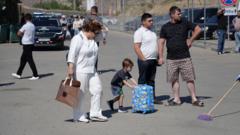**Despite the government's efforts to project stability, sentiment of defeat and internal division runs deep in Iran following recent military strikes.**
**Iran's Struggle for Normalcy Amid U.S. Strikes**

**Iran's Struggle for Normalcy Amid U.S. Strikes**
**As U.S. military actions leave a mark, Iranian officials attempt to maintain a façade of everyday life.**
In the wake of U.S. attacks on Iran’s primary nuclear facilities, government officials are grappling with an air of defeat while attempting to create a sense of normalcy. Following bombings that hit major sites like Fordo, Natanz, and Isfahan early Sunday, state media are showcasing crowds going about their daily activities, contrasting sharply with the grim reality faced by many.
The Iranian leadership is struggling to confront a feeling of national humiliation, as several officials have disclosed. Insights from Hamid Hosseini of the Chamber of Commerce's energy committee illuminate this struggle, emphasizing that Iran lacks a significant military or technological advantage. "We need to prioritize national interests," he conveyed in a phone call from Tehran. "A prolonged conflict is not the answer."
President Masoud Pezeshkian was seen engaging with citizens in Tehran, a move aimed at bolstering morale. He visited a demonstration against U.S. interventions and the hospital treating victims of recent attacks, commending the dedication of medical personnel amid ongoing hostilities. In a show of solidarity, Pezeshkian took to social media to reaffirm his commitment to the nation, declaring, "We will walk this path together. We will protect Iran and show the world that our great people are undefeatable."
As tensions ebb and flow, the Iranian government’s attempt to portray an image of resilience stands in stark contrast to the palpable uncertainty felt by many citizens as they navigate through the tumultuous aftermath of these military actions.
The Iranian leadership is struggling to confront a feeling of national humiliation, as several officials have disclosed. Insights from Hamid Hosseini of the Chamber of Commerce's energy committee illuminate this struggle, emphasizing that Iran lacks a significant military or technological advantage. "We need to prioritize national interests," he conveyed in a phone call from Tehran. "A prolonged conflict is not the answer."
President Masoud Pezeshkian was seen engaging with citizens in Tehran, a move aimed at bolstering morale. He visited a demonstration against U.S. interventions and the hospital treating victims of recent attacks, commending the dedication of medical personnel amid ongoing hostilities. In a show of solidarity, Pezeshkian took to social media to reaffirm his commitment to the nation, declaring, "We will walk this path together. We will protect Iran and show the world that our great people are undefeatable."
As tensions ebb and flow, the Iranian government’s attempt to portray an image of resilience stands in stark contrast to the palpable uncertainty felt by many citizens as they navigate through the tumultuous aftermath of these military actions.























